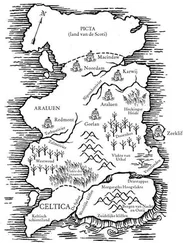All that was left of the Navane was a dark orange film, hardened against the plastic walls of the dropper bottle, segmented and flaking like dried earth. I remembered this stuff. It was the worst of the worst. It came with all kinds of warnings about going out into the sun and what to use on your skin to protect yourself from the extra sensitivity, which seemed like jokes to me, like they had to be meant as jokes. I think it was years before I stood outside in the sun at all for longer than the few minutes it took me to get from a transport van into the cool shade of the indoors.
I sniffed at the bottle. There wasn’t a whole lot of scent left; just enough for me to grab hold of the memory of what it had been like getting this stuff from the dropper to my tongue. Like forcing a cadaver to drool something sweet into my mouth. Whole sweeping narratives had formed inside me around this medication, I remembered: stories I’d told myself to make taking it less numbing, to give not just meaning but intrigue to my dull condition. Explorers on distant South American mountainsides retrieving flowers from rock cliffs whose petals alone could yield the essence that would make the nauseating syrup in the tinted bottle: but you couldn’t get the essence directly from the petals; it was far too potent for human beings, it’d kill you; first you had to feed it to sparrows, whose livers filtered out the toxins, then cut out the livers and boil all the remaining organs in water. Then you strained the resulting decoction through cheesecloth and diluted it in a ten-to-one solution, and capped the bottles you’d drained it into and kept them away from light, because what you were left with was thiothixene HCl, known commercially as Navane, which I took in oral suspension because the doctor thought without it I might see or hear bad things.
Every medication from the drawer had not just one story like this but several. Pale pink Tegretol hauled across the Caucasus by caravan under cover of night, the only man in the world capable of manufacturing it unaware that his creation was being packaged and sold to people in the hated nations of the West. Xanax, certifiably the medication that came from space, traded to the architects of our shadow government in exchange for a full map of human DNA, the eventual future costs of this trade arrangement unspoken but plain as day to everybody involved, a rash of suicides and disappearances cropping up when the uselessness of the medicine for anything beyond mild sedation was revealed. Ludiomil, the one the drug companies were lying to all the doctors about, telling them it did one thing when really it did another, all the while advising baffled treatment teams that one of Ludiomil’s side effects was to make patients lie about how it made them feel; and so the doctors kept right on prescribing it to treat something it didn’t really treat, blind actors in a study whose actual aim would never be known by anyone. I made up these stories when they brought me the medications with my breakfast, lunch, and dinner, and I refined them some after I’d been sent home. Everything became infused with purpose. It’s hard to overstate how deep the need can get for things to make sense.
There was also Darvocet. Darvocet had some stories, too, but unlike the others they were all true. I had learned them in real time: I’m burning from the neck up. Every repaired bone feels like it has been electrified. Every thought or emotion I have is focused on the pounding pain in my face, which feels as big as the side of a barn. I hurt so much that I would trade anything for relief, do anything, hurt anyone. I remember the day I tried to make a deal with the devil: how stupid I felt, how I cried to know there was no Satan to help me, how there was only the medication they’d give me when I couldn’t pretend I didn’t need it anymore. Which I tried to do all the time; I hated how much I needed all the help they gave me, hated needing to call the nurse, hated feeling like my greatest success would be in making childhood my permanent condition.
Somewhere in the middle of a long night, between one dosage of Darvocet and the next, I made a promise to myself. I remembered it now. I’d promised myself that all this was temporary, the medication and the bed in the room where the blinds were always down, and that I would get out of it somehow, get away somewhere, do something again with little reference to any of it. I didn’t promise myself future success or total recovery. Just escape. I remember that it was dark in the room when I came up with the promise, and that I had a special way of wording it that I swore to myself I’d never forget, and I noticed, now, shaking the Darvocet bottle with a few tabs left in it, that of course I had forgotten whatever the special magic words of my promise had actually been. They had been scattered to the winds long since. I don’t think I can explain why it made me happy to learn that I’d been unable to keep my promise to myself, but it did. I felt so content to have forgotten: like I’d been touched by a blessing so obscure that almost no one would ever share in it, or no one I’d ever know or hear about. Like I belonged to a tiny secret brotherhood of people who’d forgotten something hard.
I arranged the bottles into a loosely octagonal formation on the counter, and I pictured a very small person sitting at the center of the octagon, no bigger than the distal joint of my little finger, bored but safe, half-crazy from isolation but protected from the outside world. That person was me. My parents would have asked the younger me, what do you want to be safe from? After the accident nobody would ask. That was, to put it harshly, the best thing about the rifle blast that destroyed most of my face.
I saw a show about music one summer on that TV. I saw it twice.
They were showing it on TBN, the Trinity Broadcasting Network, “fifty thousand watts of power broadcasting from Costa Mesa, California”—I watched TBN a lot, because when all the other stations had powered down their transmitters for the night, TBN stayed on. After a while I started to notice patterns in the way they operated, and I came up with theories about how things worked at TBN. For example: sometimes you’d feel pretty certain you were seeing the same show twice, but I became convinced this was never actually true; maybe there’d be the same hosts and the same guests going over the same material, and it’d seem like you were watching the same thing you’d watched once already, but there were variations if you looked hard enough. I learned to look very hard. Sometimes their voices would sound different, more strained or more awake, more tired or somewhat softer. Gradations in tone. And sometimes they’d just look less involved, a little more distracted, a little less believable. But everyone would still pretend the conversation hadn’t already taken place, that all these questions hadn’t already been answered to everybody’s satisfaction.
And then sometimes, not often but for me always with a profound feeling of revelation, the conversation would go to a new place: not too far off the script, but somewhere just down a side path, for five minutes, maybe, or even less. Things would briefly open, and, in the opening, possibilities would emerge. Jan, with the high-piled hair, would remember something her mother used to say to her; or a guest would be reminded of a story he’d heard from somebody in his travels, and he’d lose the thread somewhere in the middle of the story but keep right on telling it. Or a musician from the in-studio band would say something like “That’s the first time we’ve played that song in a while,” but when you saw the same show again two nights later he’d say “We don’t get to play that song as much as we used to” instead. Or a visiting preacher might swap out a story about his trip to Houston for another about his home parish in Phoenix. Or someone would carry out a Bible verse for an extra line or two, heading off into parts unknown before breaking abruptly off.
Читать дальше












